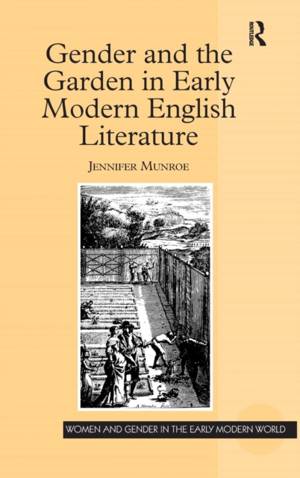
- Afhalen na 1 uur in een winkel met voorraad
- Gratis thuislevering in België vanaf € 30
- Ruim aanbod met 7 miljoen producten
- Afhalen na 1 uur in een winkel met voorraad
- Gratis thuislevering in België vanaf € 30
- Ruim aanbod met 7 miljoen producten
Zoeken
Gender and the Garden in Early Modern English Literature
Jennifer Munroe
€ 305,45
+ 610 punten
Uitvoering
Omschrijving
Radical reconfigurations in gardening practice in sixteenth- and seventeenth-century England altered the social function of the garden, offering men and women new opportunities for social mobility. While recent work has addressed how middle class men used the garden to attain this mobility, the gendering of the garden during the period has gone largely unexamined. This new study focuses on the developing gendered tension in gardening that stemmed from a shift from the garden as a means of feeding a family, to the garden as an aesthetic object imbued with status. The first part of the book focuses on how practical gardening books proposed methods for planting as they simultaneously represented gardens increasingly hierarchized by gender. The second part of the book looks at how men and women appropriated aesthetic uses of actual gardening in their poetry, and reveals a parallel gendered tension there. Munroe analyzes garden representations in the writings of such manuals writers as Gervase Markham, Thomas Hill, and William Lawson, and such poets as Edmund Spenser, Aemilia Lanyer and Lady Mary Wroth. Investigating gardens, gender and writing, Jennifer Munroe considers not only published literary representations of gardens, but also actual garden landscapes and unpublished evidence of everyday gardening practice. She de-prioritizes the text as a primary means of cultural production, showing instead the relationship between what men and women might imagine possible and represent in their writing, and everyday spatial practices and the spaces men and women occupied and made. In so doing, she also broadens our outlook on whom we can identify and value as producers of early modern social space.
Specificaties
Betrokkenen
- Auteur(s):
- Uitgeverij:
Inhoud
- Aantal bladzijden:
- 146
- Taal:
- Engels
- Reeks:
Eigenschappen
- Productcode (EAN):
- 9780754658269
- Verschijningsdatum:
- 28/06/2008
- Uitvoering:
- Hardcover
- Formaat:
- Genaaid
- Afmetingen:
- 156 mm x 234 mm
- Gewicht:
- 385 g

Alleen bij Standaard Boekhandel
+ 610 punten op je klantenkaart van Standaard Boekhandel
Beoordelingen
We publiceren alleen reviews die voldoen aan de voorwaarden voor reviews. Bekijk onze voorwaarden voor reviews.








